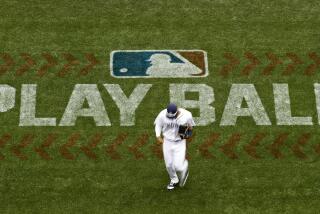Players Deserve Better Than Backward-Thinking Owners
- Share via
In two weeks, when the 1994 baseball season ends, we will have more than enough idle time to debate such matters as “Is baseball better with or without a World Series?” and “How come realignment promised more playoff games and then left us with none?”
In the meantime, let’s get one item out of the way right now.
Q: “Were the major league players of yesteryear better than those of today?”
A: “You’re kidding, right?”
As we now know, the premise behind the argument the old timers seem to hold so dear is absolutely preposterous.
The major league players of yesteryear were only asked to hit, catch, run and throw. That’s it.
The major league players of today are asked to do all that, plus save the national pastime from the 28 corked bats who currently run the sport and have charted a course that should land The Grand Old Game firmly behind hockey, soccer and rhythmic gymnastics on the fan popularity scale by the year 2000.
Think Ted Williams could have hit .400 with three owners clutching his right leg and bawling, “Please, we’re blithering idiots completely unable to restrain ourselves from shoving $1,000 bills down your pants pockets! You’re killing the game! You’re destroying competitive balance! It’s up to you to sew those pockets closed!”?
In the world according to the Lords and Madams of Baseball, major league baseball is on the brink of financial ruination (so they tell us), that 19 of 28 franchises will lose money this season (so they tell us), that the big-market teams are running the small-market teams into extinction (so they tell us) and that the game requires radical surgery called a salary cap or else it’s going to expire in its sick bed (so they tell us).
Actually, baseball’s owners did invoke a salary cap once before, in the mid-1980s. It was called collusion. It very nearly gutted the game then and there.
Since then, professional basketball and football have adopted over-the-table--and legal--salary caps, to the detriment of both games.
The NBA salary cap allows great teams to wither on the vine because one exceedingly wealthy aging ex-star refuses to retire or renegotiate (see the Lakers and James Worthy) while preventing other great teams from forming.
Now, NBA championships are won by paying one superstar huge amounts of money and surrounding him with journeymen cost-cutters because that’s all that fits under the cap (see Houston Rockets).
The NFL’s salary cap kicked in this year, creating mass chaos among panic-stricken general managers, an off-season game of musical starting quarterbacks and premature retirement for some of the league’s best-known--and best-paid--players. Is it good for the game that the New York Giants were forced to release Phil Simms before he completed injury rehab simply because he was too expensive for the cap? That the only way for fans to stay current on their favorite team is to tap the home PC into the sports wire and conduct round-the-clock searches for player transactions?
With baseball’s owners threatening to unilaterally impose similar restraints this off-season, is it any surprise the players’ union decided last week to bar the door as well as it could with an Aug. 12 strike date?
Think about what the owners are doing, since they obviously are impaired in this area.
Amid widespread reports baseball was losing its grip with the public--death by boredom is how the obituary writers were preparing to word it--baseball rallies in the bottom of the ninth with one of its most noteworthy seasons ever.
Three players--Matt Williams, Ken Griffey Jr. and Frank Thomas--are giving spirited chase to Roger Maris’ single-season home run record.
Tony Gwynn has a real chance to become baseball’s first .400 hitter in 52 years.
With cries over a juiced ball ringing in his ears, Atlanta pitcher Greg Maddux is bidding to win his third consecutive Cy Young Award with an earned-run average less than 2.00.
And, thanks to the one fling with lucidity the owners have had in recent years, realignment has produced, at the end of July, 12 teams within three games of first place in their respective divisions and five suspenseful pennant races.
Baseball is staging one of the great comebacks of all time--and the owners are prepared to shut off the lights Aug. 12 if it means shoving the salary cap down the players’ throats.
Right now, baseball is flying in the face of all the owners’ arguments in favor of a cap.
Less-than-huge-market teams from Montreal, Cincinnati, Cleveland and Texas are contenders in four of the six divisions.
Toronto, with the largest payroll in baseball, is 15 1/2 games out in the American League East.
Montreal, with one of the smallest payrolls, continues to hold off Ted Turner’s conspicuous consumers from Atlanta in the National League East.
Where is the evidence to support the desperate plea for a wage ceiling? And why are we to believe a cap on salaries is a sure-fire solution?
Already, a couple teams have tinkered with self-imposed salary caps. You know them as the Angels and the Padres, and they are the two most depressing things about this baseball season.
If that’s a sample of the future, if that’s the owners’ idea of what’s “good for the game,” let the strike begin today. And might it be a long one.
More to Read
Go beyond the scoreboard
Get the latest on L.A.'s teams in the daily Sports Report newsletter.
You may occasionally receive promotional content from the Los Angeles Times.










